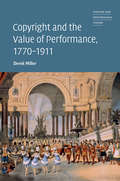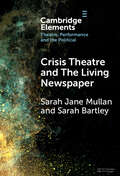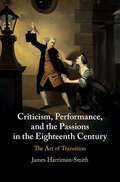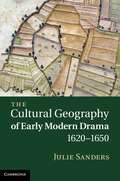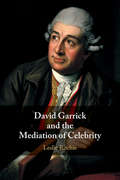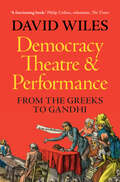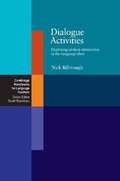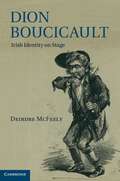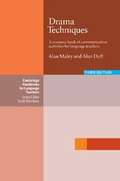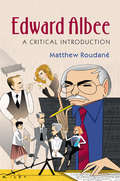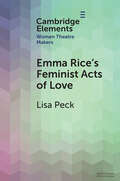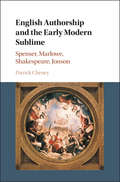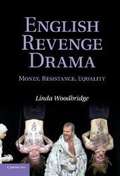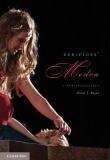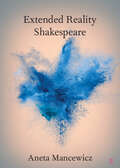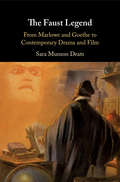- Table View
- List View
Copyright and the Value of Performance, 1770–1911 (Theatre and Performance Theory)
by Derek MillerIn the nineteenth century, copyright law expanded to include performances of theatrical and musical works. These laws transformed how people made and consumed performances. Exploring precedent-setting litigation on both sides of the Atlantic, this book traces how courts developed definitions of theater and music to suit new performance rights laws. From Gilbert and Sullivan battling to protect The Mikado to Augustin Daly petitioning to control his spectacular 'railroad scene', artists worked with courts to refine vague legal language into clear, functional theories of drama, music, and performance. Through cases that ensnared figures including Lord Byron, Laura Keene, and Dion Boucicault, this book discovers how the law theorized central aspects of performance including embodiment, affect, audience response, and the relationship between scripts and performances. This history reveals how the advent of performance rights reshaped how we value performance both as an artistic medium and as property.
Costume in the Comedies of Aristophanes
by Gwendolyn Compton-EngleThis book offers an interpretation of the handling of costume in the plays of the fifth-century comic poet Aristophanes. Drawing on both textual and material evidence from the fourth- and fifth-century Greek world, it examines three layers of costume: the bodysuit worn by the actors, the characters' clothes, and the additional layering of disguise. A chapter is also devoted to the inventive costumes of the comic chorus. Going beyond describing what costumes looked like, the book focuses instead on the dynamics of costume as it is manipulated by characters in the performance of plays. The book argues that costume is used competitively, as characters handle each other's costumes and poets vie for status using costume. This argument is informed by performance studies and by analyses of gender and the body.
Crisis Theatre and The Living Newspaper (Elements in Theatre, Performance and the Political)
by null Sarah Jane Mullan null Sarah BartleyCrisis Theatre and The Living Newspapers traces a history of the living newspaper as a theatre of crisis from Soviet Russia (1910s), through the Federal Theatre Project of the Great Depression in America (1930s), to Augusto Boal's teatro jornal in Brazil (1970s), and its resonance with documentary forms deployed in the final years of apartheid in South Africa (1990s), up until the present day in the UK (2020s). Across this Element, the author is interested in what a transnational and transhistorical examination of the living newspaper through the lens of crisis reveals about the ways in which theatre can intervene in our collective social, economic and political life. By holding these diverse examples together, the author asserts the Living Newspaper as a form of Crisis Theatre.
Critical Perspectives on Applied Theatre
by Hughes, Jenny and Nicholson, Helen Jenny Hughes Helen NicholsonAs the twenty-first century moves towards its third decade, applied theatre is being shaped by contemporary economic and environmental concerns and is contributing to new conceptual paradigms that influence the ways in which socially engaged art is produced and understood. This collection offers fresh perspectives on the aesthetics, politics and histories of applied theatre. With contributions from leading scholars in the field, the book illuminates theatre in a diverse range of global contexts and regions. Divided into three sections - histories and cultural memories; place, community and environment; and poetics and participation - the chapters interweave cutting-edge theoretical insights with examples of innovative creative practice that traverse different places, spaces and times. Essential reading for researchers and artists working within applied theatre, this collection will also be of interest to those in theatre and performance studies, education, cultural policy, social history and cultural geography.
Criticism, Performance, and the Passions in the Eighteenth Century: The Art of Transition
by James Harriman-SmithGreat art is about emotion. In the eighteenth century, and especially for the English stage, critics developed a sensitivity to both the passions of a performance and what they called the transitions between those passions. It was these pivotal transitions, scripted by authors and executed by actors, that could make King Lear beautiful, Hamlet terrifying, Archer hilarious and Zara electrifying. James Harriman-Smith recovers a lost way of appreciating theatre as a set of transitions that produce simultaneously iconic and dynamic spectacles; fascinating moments when anything seems possible. Offering fresh readings and interpretations of Shakespearean and eighteenth-century tragedy, historical acting theory and early character criticism, this volume demonstrates how a concern with transition binds drama to everything, from lyric poetry and Newtonian science, to fine art and sceptical enquiry into the nature of the self.
The Cultural Geography of Early Modern Drama, 1620–1650
by Julie SandersLiterary geographies is an exciting new area of interdisciplinary research. Innovative and engaging, this book applies theories of landscape, space and place from the discipline of cultural geography within an early modern historical context. Different kinds of drama and performance are analysed: from commercial drama by key playwrights to household masques and entertainment performed by families and in semi-official contexts. Sanders provides a fresh look at works from the careers of Ben Jonson, John Milton and Richard Brome, paying attention to geographical spaces and habitats like forests, coastlines and arctic landscapes of ice and snow, as well as the more familiar locales of early modern country estates and city streets and spaces. Overall, the book encourages readers to think about geography as kinetic, embodied and physical, not least in its literary configurations, presenting a key contribution to early modern scholarship.
David Garrick and the Mediation of Celebrity
by Leslie RitchieWhat happens when an actor owns shares in the stage on which he performs and the newspapers that review his performances? Celebrity that lasts over 240 years. From 1741, David Garrick dominated the London theatre world as the progenitor of a new 'natural' style of acting. From 1747 to 1776, he was a part-owner and manager of Drury Lane, controlling most aspects of the theatre's life. In a spectacular foreshadowing of today's media convergences, he also owned shares in papers including the St James's Chronicle and the Public Advertiser, which advertised and reviewed Drury Lane's theatrical productions. This book explores the nearly inconceivable level of cultural power generated by Garrick's entrepreneurial manufacture and mediation of his own celebrity. Using new technologies and extensive archival research, this book uncovers fresh material concerning Garrick's ownership and manipulation of the media, offering timely reflections for theatre history and media studies.
Democracy, Theatre and Performance: From the Greeks to Gandhi
by null David WilesDemocracy, argues David Wiles, is actually a form of theatre. In making his case, the author deftly investigates orators at the foundational moments of ancient and modern democracy, demonstrating how their performative skills were used to try to create a better world. People often complain about demagogues, or wish that politicians might be more sincere. But to do good, politicians (paradoxically) must be hypocrites - or actors. Moving from Athens to Indian independence via three great revolutions – in Puritan England, republican France and liberal America – the book opens up larger questions about the nature of democracy. When in the classical past Plato condemned rhetoric, the only alternative he could offer was authoritarianism. Wiles' bold historical study has profound implications for our present: calls for personal authenticity, he suggests, are not an effective way to counter the rise of populism.
Dialogue Activities
by Nick BilbroughUsing dialogues in different contexts, this book provides over 100 practical activities for teachers to adapt for their classrooms. These activities encourage learners to look at the English language through dialogues and spoken interaction from coursebooks, literature and media, as well as authentic conversation extracts. The book explores using dialogue to communicate personal meaning effectively. It covers dialogue as both 'product' and 'process' in language teaching and will encourage learners to look beyond conventional communicative strategies and practise spoken language in a fresh contextualised way.
Dion Boucicault
by Deirdre McfeelyDeirdre McFeely presents the first book-length critical study of Dion Boucicault, placing his Irish plays in the context of his overall career. The book undertakes a detailed examination of the reception of the plays in the New York-London-Dublin theatre triangle which Boucicault inhabited. Interpreting theatre history as a sociocultural phenomenon that closely approximates social history, McFeely examines the different social and political worlds in which the plays were produced, demonstrating that the complex politics of reception of the plays cannot be separated from the social and political implications of colonialism at that time. The study argues for a shift in focus from the politics of the plays, and their author, to the politics of the auditorium and the press, or the politics of reception. It is within that complex and shifting field of stage, theatre and public media that Boucicault's performance as playwright, actor and publicist is interpreted.
Disowning Knowledge: In Seven Plays of Shakespeare
by Stanley CavellReissued with a new essay on Macbeth this famous collection of essays on Shakespeare's tragedies considers these plays as responses to the crisis of knowledge and the emergence of modern skepticism provoked by the new science of the late sixteenth and early seventeenth centuries.
The Drama of Memory in Shakespeare’s History Plays
by Isabel KarremannThis book analyses the drama of memory in Shakespeare's history plays. Situating the plays in relation to the extra-dramatic contexts of early modern print culture, the Reformation and an emergent sense of nationhood, it examines the dramatic devices the theatre developed to engage with the memory crisis triggered by these historical developments. Against the established view that the theatre was a cultural site that served primarily to salvage memories, Isabel Karremann also considers the uses and functions of forgetting on the Shakespearean stage and in early modern culture. Drawing on recent developments in memory studies, new formalism and performance studies, the volume develops an innovative vocabulary and methodology for analysing Shakespeare's mnemonic dramaturgy in terms of the performance of memory that results in innovative readings of the English history plays. Karremann's book is of interest to researchers and upper-level students of Shakespeare studies, early modern drama and memory studies.
Drama Techniques: A Resource Book of Communication Activities for Language Teachers
by Alan Maley Alan Duff Penny UrThe fully revised edition of this 'classic' helps teachers give their learners the tools they need to express themselves through a range of stimulating drama contexts. This completely revised edition of the classic title Drama Techniques provides: *150 ideas for interesting and productive fluency practice *a large selection of drama-based techniques which focus learners' attention on communicative tasks or activities *techniques suitable for all levels *clear instructions for the teacher *advice on how to use the techniques in the classroom
Dramaturgy and Dramatic Character
by William StormDramatic character is among the most long-standing and familiar of artistic phenomena. From the theatre of Dionysus in ancient Greece to the modern stage, William Storm's book delivers a wide-ranging view of how characters have been conceived at pivotal moments in history. Storm reaffirms dramatic character as not only ancestrally prominent but as a continuing focus of interest. He looks closely at how stage figures compare to fictional characters in books, dramatic media, and other visual arts. Emphasis is sustained throughout on fundamental questions of how theatrical characterization relates to dramatic structure, style, and genre. Extensive attention is given to how characters think and to aspects of agency, selfhood, and consciousness. As the only book to offer a long view of theatrical characterization across this historical span, Storm's dramaturgical and theoretical investigation examines topics that remain vital and pertinent for practitioners, scholars, students of theatre and literature, and general audiences.
The Dynamics of Inheritance on the Shakespearean Stage
by Michelle M. DowdEarly modern England's system of patrilineal inheritance, in which the eldest son inherited his father's estate and title, was one of the most significant forces affecting social order in the period. Demonstrating that early modern theatre played a unique and vital role in shaping how inheritance was understood, Michelle M. Dowd explores some of the common contingencies that troubled this system: marriage and remarriage, misbehaving male heirs, and families with only daughters. Shakespearean drama helped question and reimagine inheritance practices, making room for new formulations of gendered authority, family structure, and wealth transfer. Through close readings of canonical and non-canonical plays by Shakespeare, Webster, Jonson, and others, Dowd pays particular attention to the significance of space in early modern inheritance and the historical relationship between dramatic form and the patrilineal economy. Her book will interest researchers and students of early modern drama, Shakespeare, gender studies, and socio-economic history.
Early Modern Drama, 1576-1642
by Julie SandersEngaging and stimulating, this Introduction provides a fresh vista of the early modern theatrical landscape. Chapters are arranged according to key genres (tragedy, revenge, satire, history play, pastoral and city comedy), punctuated by a series of focused case studies on topics ranging from repertoire to performance style, political events to the physical body of the actor, and from plays in print to the space of the playhouse. Julie Sanders encourages readers to engage with particular dramatic moments, such as opening scenes, skulls on stage or the conventions of disguise, and to apply the materials and methods contained in the book in inventive ways. A timeline and frequent cross-references provide continuity. Always alert to the possibilities of performance, Sanders reveals the remarkable story of early modern drama not through individual writers, but through repertoires and company practices, helping to relocate and re-imagine canonical plays and playwrights.
Early Modern Playhouse Manuscripts and the Editing of Shakespeare
by Paul WerstineEarly Modern Playhouse Manuscripts and the Editing of Shakespeare argues for editing Shakespeare's plays in a new way, without pretending to distinguish authorial from theatrical versions. Drawing on the work of the influential scholars A. W. Pollard and W. W. Greg, Werstine tackles the difficult issues surrounding 'foul papers' and 'promptbooks' to redefine these fundamental categories of current Shakespeare editing. In an extensive and detailed analysis, this book offers insight into the methods of theatrical personnel and a reconstruction of backstage practices in playhouses of Shakespeare's time. The book also includes a detailed analysis of nineteen manuscripts and three quartos marked up for performance - documents that together provide precious insight into how plays were put into production. Using these surviving manuscripts as a framework, Werstine goes on to explore editorial choices about what to give today's readers as 'Shakespeare'.
Edward Albee: A Critical Introduction
by Matthew RoudanéEdward Albee (1928–2016) was a central figure in modern American theatre, and his bold and often experimental theatrical style won him wide acclaim. This book explores the issues, public and private, that so influenced Albee's vision over five decades, from his first great success, The Zoo Story (1959), to his last play, Me, Myself, & I (2008). Matthew Roudané covers all of Albee's original works in this comprehensive, clearly structured, and up-to-date study of the playwright's life and career: in Part I, the volume explores Albee's background and the historical contexts of his work; Part II concentrates on twenty-four of his plays, including Who's Afraid of Virginia Woolf? (1962); and Part III investigates his critical reception. Surveying Albee's relationship with Broadway, and including interviews conducted with Albee himself, this book will be of great importance for theatregoers and students seeking an accessible yet incisive introduction to this extraordinary American playwright. The only book to cover all of Albee's plays, making this the most thorough and up-to-date study of the playwright's work Contains material from personal interviews conducted with Albee, presenting unique insights from the man himself Accessibly written and chronologically ordered, it allows readers to easily follow the development of Albee's style and theatrical vision over the course of his career
Emma Rice's Feminist Acts of Love (Elements in Women Theatre Makers)
by Lisa PeckThis is a love story but not as you know it. Should an academic study be framed in this way? Love seems an unlikely bedfellow for critical thinking. Watching an Emma Rice production and being in her rehearsal room you feel the love: a warm and generous welcoming in; a joyful celebration of the theatrical exchange. What produces this pleasurable affect and how might we consider its political potential? This Element positions Emma's theatre-making, a body of work spanning three decades, as feminist acts of love. Drawing on fieldwork research her practice is viewed through the critical lenses of feminisms and affect to consider its contextual tensions, its ethics of affirmation, staging of femininities and contribution to queer worldmaking. Mapping her work from this perspective brings to light her important contribution to UK feminist theatre; its love activism offering an emergent strategy for change.
English Authorship and the Early Modern Sublime: Fictions Of Transport In Spenser, Marlowe, Jonson, And Shakespeare
by Patrick CheneyPatrick Cheney's new book places the sublime at the heart of poems and plays in late sixteenth- and early seventeenth-century England. <P><P>Specifically, Cheney argues for the importance of an 'early modern sublime' to the advent of modern authorship in Spenser, Marlowe, Shakespeare, and Jonson. Chapters feature a model of creative excellence and social liberty that helps explain the greatness of the English Renaissance. Cheney's argument revises the received wisdom, which locates the sublime in the eighteenth-century philosophical 'subject'. <P>The book demonstrates that canonical works like The Faerie Queene and King Lear reinvent sublimity as a new standard of authorship. This standard emerges not only in rational, patriotic paradigms of classical and Christian goodness but also in the eternizing greatness of the author's work: free, heightened, ecstatic. Playing a centralizing role in the advent of modern authorship, the early modern sublime becomes a catalyst in the formation of an English canon.<P> The first book to place the sublime at the heart of poems and plays in late sixteenth- and early seventeenth-century England.<P> Links recent work on the classical or medieval sublime and the modern sublime.<P> Introduces a new model of authorship featuring an aesthetics of sublimity focussing on writers such as Edmund Spenser, Christopher Marlowe, William Shakespeare, and Ben Jonson.
English Revenge Drama: Money, Resistance, Equality
by Linda WoodbridgeVengeance permeates English Renaissance drama - for example, it crops up in all but two of Shakespeare's plays. This book explores why a supposedly forgiving Christian culture should have relished such bloodthirsty, vengeful plays. A clue lies in the plays' passion for fairness, a preoccupation suggesting widespread resentment of systemic unfairness - legal, economic, political, and social. Revengers' precise equivalents - the father of two beheaded sons obliges his enemy to eat her two sons' heads - are vigilante versions of Elizabethan law, where penalties suit the crimes: thieves' hands were cut off, scolds' tongues bridled. The revengers' language of 'paying' hints at the operation of revenge in the service of economic redress. Revenge makes contact with resistance theory, justifying overthrow of tyrants, and some revengers challenge the fundamental inequity of social class. Woodbridge demonstrates how, for all their sensationalism, their macabre comedy and outlandish gore, Renaissance revenge plays do some serious cultural work.
Environmental Degradation in Jacobean Drama
by Bruce BoehrerIn Environmental Degradation in Jacobean Drama, Bruce Boehrer provides the first general history of the Shakespearean stage to focus primarily on ecological issues. Early modern English drama was conditioned by the environmental events of the cities and landscapes within which it developed. Boehrer introduces Jacobean London as the first modern European metropolis in an England beset by problems of overpopulation; depletion of resources and species; land, water and air pollution; disease and other health-related issues; and associated changes in social behavior and cultural output. In six chapters he discusses the work of the most productive and influential playwrights of the day: Shakespeare, Jonson, Middleton, Fletcher, Dekker and Heywood, exploring the strategies by which they made sense of radical ecological change in their drama. In the process, Boehrer sketches out these playwrights' differing responses to environmental issues and traces their legacy for later literary formulations of green consciousness.
Euripides' Medea
by Diane J. RayorEuripides' Medea comes alive in this new translation that will be useful for both academic study and stage production. Diane J. Rayor's accurate yet accessible translation reflects the play's inherent theatricality and vibrant poetry. The book includes an analytical introduction and comprehensive notes, and an essay on directing Medea by stage director Karen Libman. The play begins after Medea, a princess in her own land, has sacrificed everything for Jason: she helped him in his quest for the Golden Fleece, eloped with him to Greece, and bore him sons. When Jason breaks his oath to her and betrays her by marrying the king's daughter – his ticket to the throne – Medea contemplates the ultimate retribution. What happens when words deceive and those you trust most do not mean what they say? Euripides' most enduring Greek tragedy is a fascinating and disturbing story of how far a woman will go to take revenge in a man's world.
Extended Reality Shakespeare (Elements in Shakespeare Performance)
by null Aneta MancewiczThis Element argues for the importance of extended reality as an innovative force that changes the understanding of theatre and Shakespeare. It shows how the inclusion of augmented and virtual realities in performance can reconfigure the senses of the experiencers, enabling them to engage with technology actively. Such engagements can, in turn, result in new forms of presence, embodiment, eventfulness, and interaction. In drawing on Shakespeare's dramas as source material, this Element recognises the growing practice of staging them in an extended reality mode, and their potential to advance the development of extended reality. Given Shakespeare's emphasis on metatheatre, his works can inspire the layering of environments and the experiences of transition between the environments both features that distinguish extended reality. The author's examination of selected works in this Element unveils creative convergences between Shakespeare's dramaturgy and digital technology.
The Faust Legend: From Marlowe and Goethe to Contemporary Drama and Film
by Sara Munson DeatsWhat do men and women desire? For what will they barter their immortal souls? These two questions have haunted Western society, and these persistent queries find their fullest embodiment in the Faust legend. This memorable story, told and retold in novels, prose fiction, and drama, has also profoundly influenced music, art, and cinema. Sara Munson Deats explores its impact, tracing the development of the Faust topos from the seminal works of Marlowe and Goethe to the large number of dramatic and cinematic adaptations which have fascinated audiences and readers throughout the centuries. Her study traces the durability of this legend and its pervasive influence on the literature of the Western world, in which it has adapted across time, languages, and nations to reflect the concerns of a given era or place. This is the first comparative analysis of the Faust legend in drama and film.
